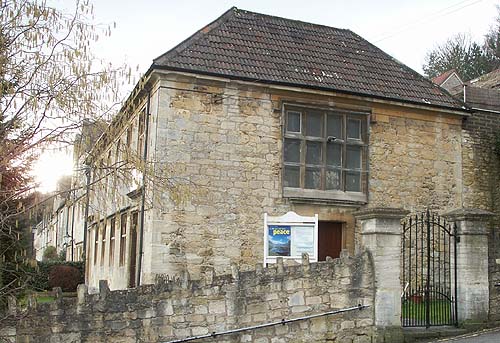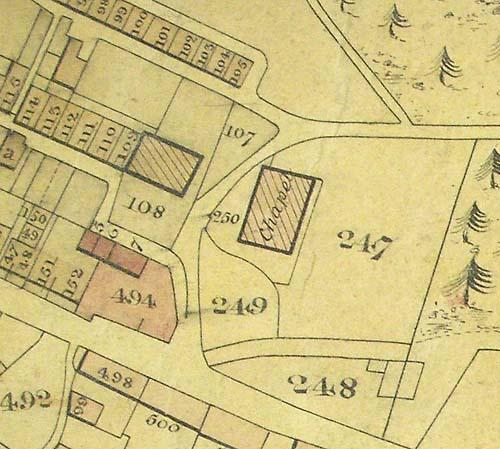7.
Grove Meeting House, Middle Rank, Bradford on Avon

THE GROVE MEETING-HOUSE
This is the oldest Non-conformist place of worship in the town of Bradford. It is situated at the east end of what is called Middle Bank, and on the slope of the hill behind the house formerly occupied by the Methuen family. Aubrey's description of ' the side of the high hill, facing the south, above Mr. Paul Methwin's house,' which, in his time was covered with elder-trees. Hence the name of,- the ' Grove ' Meeting-House or Chapel.
There is something singularly picturesque in the present appearance of this structure. From long disuse it is fast hastening to decay. Its mullioned casement windows are now hidden by luxuriant ivy-tresses, which enshroud the top part of the building. It bears on its front an air of antique respectability, and is a fair type of the places of worship that sprung up quickly after the passing of theToleration Act at the close of the seventeenth century, for theof 'be Presbyterian and Independent Non-conformists. The date of the erection of this Chapel, which was built for the use of those who inclined to Presbyterianism,amongst whom, at one time, were numbered some of the principal inhabitants of the town and neighbourhood,-was about A.D. 1698. It is believed that it owed its origin to the efforts of gome of the Clergy, who, when the Act of Uniformity was passed, retired from the Established Church. Indeed, the Rev. T. Jones, who was ejected from Calne, is supposed to have assisted to found the Society which met at the Grove
Meeting.
At the close of the 17th century a Mr. Dangerfield was the stated minister of this place of worship. In 1715 Mr. Thomas Barker filled that office, and continued to do BO till 1729. He was succeeded by Mr. (afterwards Dr.) Joshua Read, who seems to have been associated in his office with a Mr. Wereat. The views of this last-named gentleman were in sympathy with what is commonly termed Arianism, and, in consequence of this, a secession took place of several who had been accustomed to attend the 'Grove Chapel.' Walter Grant, of Monkton Farleigh, and John Pitman, of Bradford, were the chief persons who retired, and through their instrumentality it was, that, in 1740, an Independent Chapel was built at Morgan's Hill, the first minister being the above-mentioned Dr. Joshua Bead. This last-named chapel was subsequently endowed by Walter Grant and John Pitman, by will, with Property amounting, when invested in the public funds, to £2144 13s, 2d., three per cent Reduced Annuities.
Immediately after this secession from the ' Grove Chapel" we find Dr. Roger Flexman appointed as its minister he remained there about eight years, when (in 1747) he removedl to Rotherhithe, and was succeeded by Mr. Samuel Billingsley a member of an old Presbyterian family of Ashwick in Somerset, the founders of the Meeting-House at that place Mr. Billingsley resigned the office at the end of ten years.
In 1763 Mr. James Foot of Chard, a pupil of Dr. Doddridge was minister of this chapel, and continued to be so till his death, (about 1777,) when he was succeeded by Mr. Williams of Calne, who died in 1810. This last-named gentleman was engaged in some kind of secular appointment, which was exceedingly distasteful to many of the old Presbyterian attendants at the chapel. Before his decease many of the more influential and wealthy of them had either conformed to the Established Church, or left the district, and the places of those who were removed by death were not supplied by others. Those who remained were but few in number, and openly professed themselves, - Unitarians. In 1793 a Liturgy, similar to that used at the principal Unitarian Chapel at Manchester, was in use at the Grove Meeting-House.
On the decease of Mr. Williams, Mr. John Evans of Bristol for a short time acted as minister, after which the Meeting-House was let to a body of Trinitarian Dissenters for several years. This lastnamed body subsequently built a chapel for themselves, a Mr. Coombs being their minister.
In the year 1822, Mr. Eichard Wright, who was the minister of a Dissenting congregation meeting at the Conigre, Trowbridge, re-opened the Grove Chapel, and for five years preached in it every Sunday morning. In 1827, Mr. Samuel Martin succeeded to Mr. Wright at Trowbridge, and for some time followed his practice with regard to a weekly service m the Grove Meeting. For many yerrs past, however, the service has been very irregular. Latterly it has been he only once or twice in the year, for the purpose of securing * small endowment, hardly more than sufficient to keep building wind and water tight. The endowment arises from the rents of two houses in the immediate neighbourhood of the chapel and produces from £10 to £12 a year.
Few memorials remain either of former ministers or of attenndants of this chapel. Of Dr. Roger Flexman, who was a of some literary attainments, we are able to give a few particulars.
He was born at Great Torrington in Devonshire, in the year 1708, and educated for the ministry, among the Presbyterian denomination, by the Rev. John Moore. He was set apart for this work at Modbury by some of his Presbyterian brethren. After officiating at Chard and Crediton, he came to Bradford at the close of 1739. In 1747 he married Catharine the daughter of Mr. John Yerbury, one of the principal members of the congregation attending the Grove Meeting, and in the same year removed to another chapel at Jamaica Row, Rotherhithe. In 1783 he resigned his office from ill-health, but continued to fulfil the duties of Lecturer at St. Helen's, (to which he was elected in 1754) and preached there occasionally until his decease at the age of 88, in the year 1795.
Of Dr. Flexman's sentiments we are told, by Mr. Walter Wilson, that "they coincided very much with those of Dr. Amory," whose opinions " with regard to both natural and revealed religion, nearly agreed with those of Dr. Samuel Clarke, and of the eminent divines who were coadjutors with that great man. He did not therefore fall in with the Socinian principles; neither did he reject the natural evidences of the life to come, or the notion of a separate state." Dr. Flexman, he adds, " was a strenuous advocate for the pre-existent dignity of Jesus Christ, and the personality of the Holy Spirit. He maintained the essential distinction between the soul and the body, and the liberty of the human will in opposition to Materialists and necessitarians."
Dr. Flexman was well known in the literary circles of his
day and was especially noted for his accurate knowledge of
nghsh History. He was employed by the Government as one of the compiler of the General Index to the ' Journals ofthe House of Commons;' the eighth and three follow" volumes, containing the Parliamentary proceedings from Ififin to 1697, having been assigned to him. This elaborate work was commenced in 1776 and completed in 1780. He published several Sermons and Tracts: amongst the most important of his productions were ' An account of the writing of Bishop Bumet,' and 'Critical, Historical, and Political Miscellanies,' containing remarks on various authors, amonsat whom were Archbishops Potter and Seeker, and Bishops Sherlock, Warbuton, and Lowth. His abilities and attainments acquired for him the honorary degree of D.D. from the Marischat College of Aberdeen in 1770.
By a deed dated January 2, 1698, Anthony Methuen conveyed the ground, on which the ' Grove Meeting was shortly afterwards erected to Francis Yerbury, the elder, of Ashloy, Francis Yerbury, the younger, of Bradford, William Chandler, of Bradford, and Thomas Bush, of Bradford.

1837
Map of Bradford showing the Grove Meeting House(108) and the Zion Chapel to the
right of it